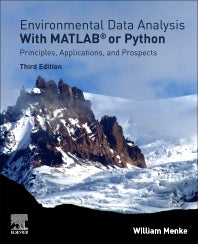Freshly Printed - allow 10 days lead
Couldn't load pickup availability
Environmental Data Analysis with MatLab or Python
Principles, Applications, and Prospects
Demonstrates the construction of proofs to help students develop the skills they need to transition to higher-level, more abstract math courses
William Menke (Author)
9780323955768, Elsevier Science
Paperback / softback, published 18 August 2022
466 pages
23.5 x 19 x 2.9 cm, 0.95 kg
Environmental Data Analysis with MATLAB, Third Edition, is a new edition that expands fundamentally on the original with an expanded tutorial approach, more clear organization, new crib sheets, and problem sets providing a clear learning path for students and researchers working to analyze real data sets in the environmental sciences. The work teaches the basics of the underlying theory of data analysis and then reinforces that knowledge with carefully chosen, realistic scenarios, including case studies in each chapter. The new edition is expanded to include applications to Python, an open source software environment. Significant content in Environmental Data Analysis with MATLAB, Third Edition is devoted to teaching how the programs can be effectively used in an environmental data analysis setting. This new edition offers chapters that can both be used as self-contained resources or as a step-by-step guide for students, and is supplemented with data and scripts to demonstrate relevant use cases.
1. Data Analysis with MATLAB or Python 2. Systematic explorations of a new dataset 3. Modeling observational noise with random variables 4. Linear models as the foundation of data analysis 5. Least squares with prior information 6. Detecting periodicities with Fourier analysis 7. Modeling time-dependent behavior with filters 8. Undirected data analysis using factors, empirical orthogonal functions and clusters 9. Detecting and understanding correlations among data 10. Interpolation, Gaussian Process Regression and Kriging 11. Approximate methods, including linearization and artificial neural networks 12. Assessing the significance of results
Subject Areas: Environmental monitoring [TQD], The environment [RN], Stochastics [PBWL]


